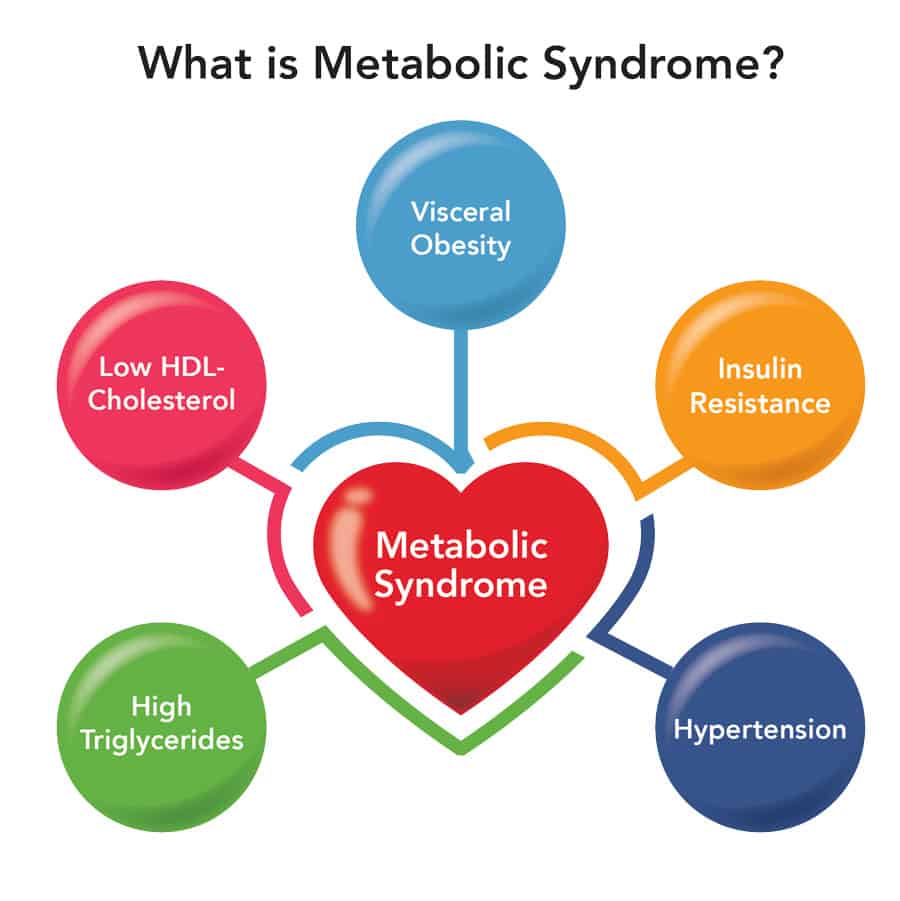Metabolic Syndrome is a cluster of conditions that occur together, increasing one’s risk for heart disease, stroke, and Type 2 diabetes. The main conditions include abdominal obesity, high blood pressure, high triglycerides, low HDL cholesterol levels, and insulin resistance. Although there is no one cause of Metabolic Syndrome, it is often seen in people who are overweight or obese. Family history also plays a role.
If you have three or more of the following five key components of Metabolic Syndrome, you are considered to have the syndrome:
* Waist circumference equal to or greater than 35 inches for women and 40 inches for men
* Triglyceride level equal to or greater than 150 mg/dL
* HDL cholesterol level less than 40 mg/dL for men and 50 mg/dL for women (this number may be different depending on your doctor)
* Blood pressure equal to or higher than 130/85 mmHg (this number may be different depending on your doctor)
* Fasting glucose level equal to or higher than 100 mg/dL
(This number may be different depending on your doctor.) If you have any questions about whether these numbers apply to you specifically, please talk with your doctor.
The most common symptom of Metabolic Syndrome is abdominal obesity. People with this condition usually have an “apple-shaped” body type, meaning they carry most of their weight around their waists. This extra weight puts them at a higher risk for developing the other conditions associated with Metabolic Syndrome. Other symptoms include:
* High blood pressure (hypertension)
* High levels of sugar in the blood (hyperglycemia) due to insulin resistance or diabetes mellitus type 2
* Excess fat around the waist and abdomen (central obesity), which produces hormones that increase the risk factors for heart disease and other problems * Abnormal lipid profile (increased triglycerides and LDL cholesterol; decreased HDL cholesterol)
While there is no cure for Metallic taste buds can indicate many things including zinc deficiency anemia pregnancy kidney failure certain medications such as those used to treat cancer chemotherapy side effects radiation therapy side effects some infections head injury trauma lead poisoning liver disease Wilson’s diseasemetallic poisoning mercury poisoning Gaucher’s disease porphyria thallium poisoning thyroiditis some forms genetic disorders such as hemochromatosis familial dysautonomia hereditary coproporphyriavarious types cancer including leukemia multiple myeloma ovarian cancer breast cancer small cell lung cancer various types solid tumors metastatic carcinoid tumor paraganglioma phaeochromocytomaMELAS syndrome mitochondrial encephalomyopathy lactic acidosis stroke like episodes Leigh’s disease Leber’s hereditary optic neuropathy North American Indian childhood cirrhosis phenotype adrenoleukodystrophy X linked adrenomyeloneuropathy Wernicke Korsakoff syndrome niacin vitamin B3 deficiency pellagra tryptophan metabolism disorder serotonin syndrome certain foods such as cilantro coriander Indian Gooseberry kiwifruit Monosodium glutamate MSG nutmeg sage Szechuan pepper tangerine thyme long term alcohol abuse withdrawal from alcohol barbiturate Benzodiazepines ethanol general anesthesia lidocaine propofol sedatives hypnotics sleep aids zolpidem Zopiclone Zyprexa olanzapine quetiapine risperidone Seroquel ziprasidone Geodon haloperidol Haldol Loxapine Olanzapine Fluphenazine Perphenazine Thorazine trifluoperazine Stelazine pimozide Orap thioridazine Mellaril antipsychotic drugs chlorpromazine thoridazinethe presence these can result false positive test resultstests measuring substances urine drug screen amphetamines MDMA methadone opioids phencyclidine PCP Barbiturates Benzodiazepines Cannabis Cocaine OpiatesPlease note not complete list possible causes Metallic taste consult healthcare professional if experience symptom does not resolve within short period time especially case accompanied severe persistent pain rash hives difficulty breathing swallowing talking wheezing uncontrolled muscle spasms change behavior vision changes mental status confusion slurred speech seizure coma death Seek medical attention immediately emergency room hotline poison control centerIf think someone has ingested swallowed large amount poisonous plant material contact local emergency services immediately do not wait see if person becomes ill first time delay could prove fatalCall 911Now let’s discuss how prevent metabolic syndrome shall weStart by maintaining healthy weight eating nutritious foods exercising regularly reducing stress managing treatment any existing health conditions under control all help reduce risks developing metabolic issues later life regular checkups screenings important detecting early signs problems so treatment can begin right away Some specific lifestyle changes recommended people diagnosed metabolic syndrome include:Losing weight if overweightReducing calorie intakeCutting down portion sizesEating slowly until feeling fullAvoiding sugary drinksLimit drinking alcoholEngage regular moderate physical activity dailyAiming 30 minutes aerobic activity most days weekStrength training two times per weekReducing stresslevelsManaging chronic health conditionsTalk therapist counselor about ways manage stress betterGet adequate sleep each nightAdults need seven eight hours nightlyChildren need nine ten hours nightlyTeens need eight nine hours nightlyInfants four months six months need 14 15 hours nightlyNewborns babies two weeks old need 16 18 hours nightlyOlder adults 65 years age tend require less sleep between seven eight hoursYou might also interested reading articles related topics including tips living healthier lifestyle https://www..com//lifestyle


